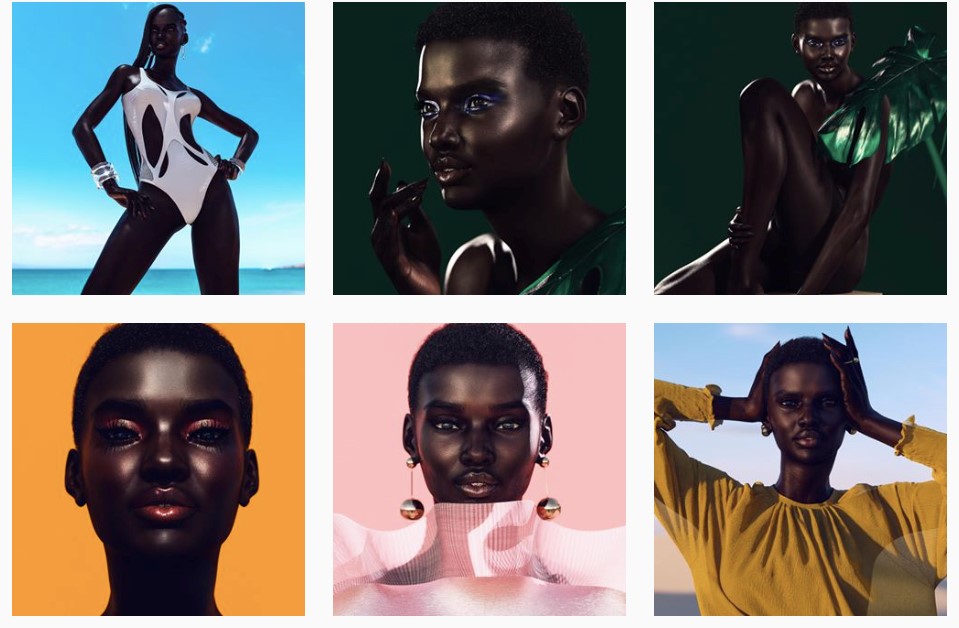Imagine a world without human models…without the cat fights, the tears, the endless dieting. In fact, it’s not even necessary to imagine because that world is already here, with artificial intelligence taking its first steps to replace human models and upend the entire fashion industry.
Fashion retailers are starting to find it easier to forego flesh and bones and make their own models who won’t argue about contractual terms.
It started with Shudu, the world’s first digital supermodel whose debut was a social media hit featuring lipstick from Rihanna’s Fenty make-up brand. Followers immediately flocked to Shudu on Instagram, with the original image exceeding the average amount of likes and engagement almost four times. Shudu got 222,000 likes compared to an average of around 50,000.
Today Shudu has more than 130,000 followers.

(Click to enlarge)
Shudu became an overnight sensation for her creator, British photographer Cameron James Wilson, and though she isn’t human, filters make her look every bit as real as a human supermodel covered in make-up. In fact, no one realized she wasn’t human when they started falling in love with Shudu on Instagram.
That fact brought Wilson a fair amount of criticism for failing to be completely honest, though the photographer claims he never intended to fool people; rather, to prove something to himself. Perhaps, that reality is open to various interpretations. Models, after all, are already on shaky grounds in terms of reality and one could argue that they are practically digital when all is said and done.
Related: Google In Talks With Tencent Over Cloud Business
"Can I create this illusion that she is real? The answer to that question was overwhelmingly answered as yes I can create that illusion," Wilson said, admitting that it was shocking to him that people believed she was real.
Lil Miquela is another digital model, created by the Los Angeles startup Brud, posting on Instagram since 2016.

(Click to enlarge)
Miquela also voices support for social causes like Black Lives Matter and has partnered with Prada on a campaign for Milan Fashion Week. She's even released a few songs on Spotify.
Her fans are fine with the existential question here—they don’t care that she’s not human. She is still closing in on a million Instagram followers.
But she’s entered the human world in one very interesting way: Time magazine put Miquela on the list of the 25 most influential “people” on the Internet, together with Rihanna and President Trump.
So, are we done with human models? Not entirely, says the British photographer.
“Do I think 3-D models will impact editorials and put human models out of work- no, not really,” Wilson said. “It’s a completely different space.”
Others see things differently.
Kevin Boon, the owner of Boon Models, told The Lily fashion magazine that If credible-looking digital models emerge, the industry is in for some major disruption.
“People don’t connect with images that resemble cartoons,” Boon said. “But if avatars begin to look like real people, it’s going to take a lot of power away from modeling agencies. Brands will only need human models for promotional events and walking the runways, and that’s pretty much it.”
The wild success of Shudu and Lil Miquela demonstrate that this proving grounds is solid, and the future is a very blurry line between fantasy and reality as retailers find another way to cash in on fashion.
Related: Bitcoin Could Challenge Gold As Major Asset Class
Shudu and Lil Miquela are just the beginning of avatar revolution, taking fashion industry in completely different direction.
“There’s plenty of models out there, but it’s hard to find somebody who is truly unique,” Wilson said. A 3-D model can’t walk down a runaway for you, but they can be digital spokespeople that help you shop or serve as the face of your customer service.”
Big bucks aside, some still have qualms about our ability to navigate a world of questionable realities. Jennifer Grygiel, a social media professor at Syracuse University's Newhouse School, isn’t keen on the potential social consequences of what she calls a “mass deception”.
"When I was growing up, at least we knew Barbie was a doll," Grygiel told CNN. "For over two years now, there could be people, teenagers especially, who thought [Miquela] maybe was a person," she said. "We need the brands to disclose. We also need these companies to help so they're not facilitating and participating in this mass deception."
Renee Engeln, a Northwestern University professor and psychologist who studies body image, is also troubled by the unrealistic quest for perfection and its effect on the self-esteem of women.
"There is no world in which this is good for women's health," Engeln told CNN. "To know that women are going to be comparing themselves to women who ... are literally inhuman strikes me as some kind of joke that isn't very funny."
By Damir Kaletovic for Safehaven.com
More Top Reads From Safehaven.com
















